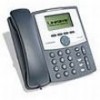Linksys SPA922 Cisco SPA9000 Voice System Administration Guide - Page 170
Using the SPA9000 with a Firewall or Router, Voice > SIP, PBX Parameters, Force Media Proxy
 |
UPC - 745883570836
View all Linksys SPA922 manuals
Add to My Manuals
Save this manual to your list of manuals |
Page 170 highlights
Advanced Topics in SPA9000 Administration Technology Background A To enable the media proxy, go to the Voice > SIP page, PBX Parameters section, and set the Force Media Proxy parameter to True. With the media proxy enabled, when UserA calls User C, the SPA9000 still acts as the SIP proxy and forwards the request to the SIP server on the ITSP. However, even after the SIP session is established, the SPA9000 continues to direct RTP packets between UserA and the ITSP. Local traffic is not affected by this configuration. When UserA initiates a call to UserB, RTP traffic still flows directly between the two UAs. The media proxy only affects RTP traffic to a UA connected through the ITSP. Using the SPA9000 with a Firewall or Router When using the SPA9000 behind a firewall or router, make sure that the following ports are not blocked: • SIP ports-By default, UDP ports 5060 through 5063 • RTP ports-16384 to 16482 Also disable SPI if this function exists on your firewall. SPA9000 Voice System Administration Guide 168















